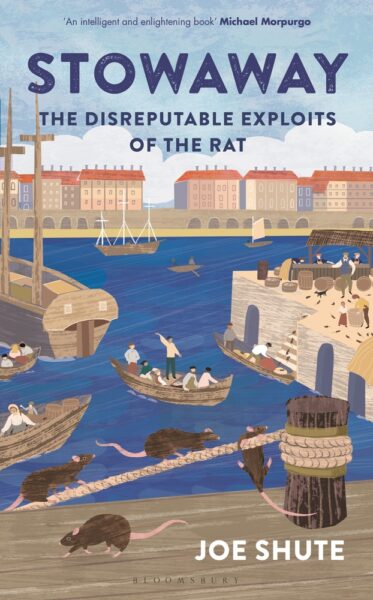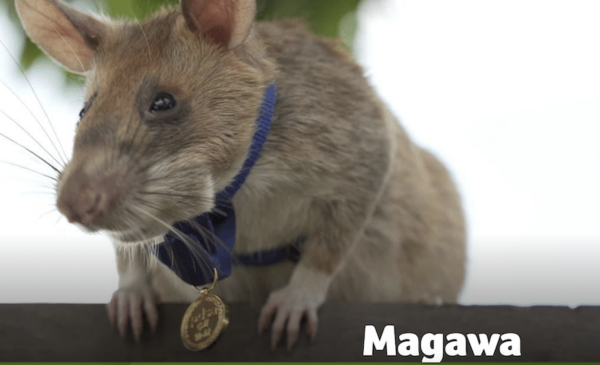
We have the pandemic to thank for this eye-opening, empathetic and long-overdue tribute to one of our most misunderstood and widely despised relatives.
The rat.
And I use relative intentionally as I learned from the book that the human species descends from rats.
During the early days of Covid, while so many people were out adopting puppies, author Joe Shute and his wife adopted a pair of rats which they named Molly and Ermentrude. The author had always had a fear of rats and viewed lockdown as an opportunity to get up close and personal with an animal that has outsmarted humans for centuries.
As Shute gets to know his new companions he takes us on a journey across England and around the world as he demolishes common myths and, no, there are not millions rats underneath manhole covers just waiting to burst through and invade human civilization. The truth is that they are far less populous than most media (and pest control companies) would have you believe. One study estimated there were fewer than seven million rats across all of England (there are more dogs). And maybe instead of trying to eradicate rats (a futile task) the author suggests a more practical and less violent next step: Coexistence.
He writes: “After centuries of largely futile efforts to rid cities of rates, adopting a more benign approach is beginning to gain currency. One intriguing anthropological study recently conducted in Amsterdam, considered the rights of rates to belong in a city. … If left along, with with access to food, urban rat populations with remain entrenched in the same locations for many generations, if not centuries.”
But it is also true that rats have an insatiable need to chew through things, sometimes things we’d rather they not. Like our homes and automobiles. Rats can even gnaw their way through concrete. Their jaws are more powerful than bears, hyenas even sharks — and 20 times more powerful than the bite of a human. But they also need to keep chewing as their front incisors never stop growing. Without continuous nibbling, their teeth would extend out and curl back inside their skulls, killing them. So perhaps we who have suffered from a rat’s gnawing should know that it wasn’t personal, but partly out of survival.
And did you know that rats laugh? Rats are capable of altruism, regret, and possess impressive powers of memory as well as being able to judge the passage of time. We know this through numerous studies which, ironically, led to the deaths of these same creatures.
Which underscores just how poorly treated rats are in society. They have no rights to speak of in the US. In fact, we have no data on exactly how many rats are killed within research labs because no such records are required. The EU, at least, requires a scientific justification for research, which has led to a decrease in the use of rats in studies.
Across Asia, rats are not so demonized. A rat occupies the first sign of the Chinese Zodiac and rats are featured in Japanese art. Yet in the West, rats are synonymous with pests and disease. And God help any criminal who dares ‘rat’ out his or her colleagues.
Another irony, because rats are loyal to loved ones and will often risk their lives to protect them.
Rats are widely associated with carrying diseases and this is still sadly true in many emerging countries. Shute takes us along to Africa as he observes researchers trying to eradicate rats in certain villages. It’s not a easy scene to witness, the killing of hundreds of rates, but Shute stresses that industrial agriculture, such as monoculture sugar plantations, has fueled the problem, placing poorly housed employees and their families in close proximity to virtually endless supplies of food and the rats who feed on it. If society only did a better job of caring for the human species — better housing and infrastructure — these horrible rat encounters would be far less common.
But for all the negative publicity surrounding rats, it should also be known that rats save lives. Shute introduces us to an organization that trains rats to identify land mines. These rats have helped clear mines from 33 million square meters of land in Cambodia. One rat, Magawa, made global headlines in earning the PSDA Dickin Medal for serving bravely in conflict zones.

After reading this book one might wonder what species will be left for us to kill with impunity.
Perhaps that’s the point.
If rats are worthy of respect and even love, what does that mean for the many other species that we ignore or, worse, kill and eat without a second thought.
This book gave me a reason to reconsider rats and, hopefully, it will do the same for you.
John is co-author, with Midge Raymond, of the Tasmanian mystery Devils Island. He is also author of the novels The Tourist Trail and Where Oceans Hide Their Dead. Co-founder of Ashland Creek Press and editor of Writing for Animals (also now a writing program).

